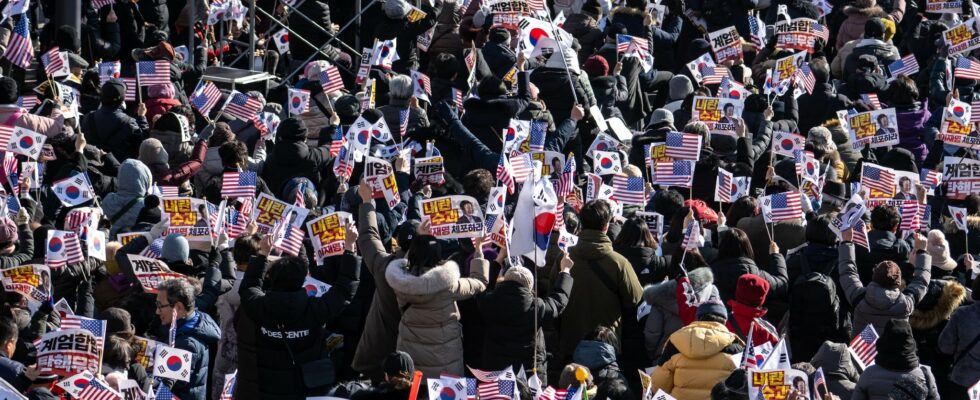Holed up in his residence, deposed South Korean President Yoon Suk-yeol resists this Thursday, January 2 for the third day following his arrest, promising to “fight until the end” against the authorities who seek to question him on his failed attempt to impose martial law.
The Senior Corruption Investigation Office (CIO), which is centralizing investigations into the December 3 coup, has until January 6 to execute the arrest warrant issued by a Seoul court against Yoon Suk -yeol. The IOC requested the arrest warrant after the deposed president ignored three consecutive summons to be questioned.
Yoon Suk-yeol stunned South Korea on the night of December 3 to 4 by imposing martial law and sending the army to Parliament to try to muzzle him, an episode that reminded the country of the dark hours of the dictatorship military. He was forced to backtrack a few hours later, when MPs managed to enter Parliament and pass a motion demanding the lifting of martial law while their aides blocked the chamber doors with furniture and thousands of pro-democracy protesters gathered outside.
Yoon Suk-yeol was impeached by Parliament on December 14 and is under investigation for “rebellion”, a crime punishable by death. Since the arrest warrant was issued on Tuesday, supporters and detractors of Yoon Suk-yeol have been demonstrating almost constantly near his residence in Seoul, insulting each other over the police officers who separate them.
“I swear to fight by your side until the end”
The 64-year-old former star prosecutor has shown no contrition since his dismissal, going so far as to send a message of distrust to his base. “The Republic of Korea is currently in danger due to internal and external forces threatening its sovereignty, and the activities of anti-state elements,” he wrote in a letter distributed to his supporters camped near his home , and whose authenticity was confirmed to AFP by his lawyer Yoon Kab-keun. “I swear to fight with you until the end to protect this nation,” he added, revealing that he was watching the protests outside his home live on YouTube.
A “delusional” message, denounced Jo Seoung-lae, spokesperson for the Democratic Party, the main opposition force, accusing Yoon Suk-yeol of inciting violence. The deposed president, who does not have the right to leave the country, is in his official residence in Seoul, his lawyer confirmed to AFP. His legal team has filed an appeal against the arrest warrant, arguing that it is “unlawful and invalid.”
IOC chief Oh Dong-woon warned that anyone who tried to prevent Yoon Suk-yeol’s arrest could face prosecution themselves. A court also issued search warrants for the official residence of the deposed president and other locations, an IOC official told AFP. But the presidential security service has so far prevented investigators from entering, citing a law prohibiting searches of places containing state secrets without the consent of the person responsible.
It is unclear how many guards are with Yoon Suk-yeol, and how they will react if arrested. The official line of the presidential security service is to obey court orders. But it has already happened, in 2000 and 2004, that the South Korean authorities failed to arrest elected officials wanted by the courts because a crowd of supporters had prevented the police from seizing the suspects during the seven days during which the arrest warrants were valid.
The former Korean leader is currently suspended, waiting for the Constitutional Court to validate or invalidate the impeachment voted by the deputies by mid-June. He remains on paper the president of the country.
A worsening political crisis
The crisis worsened on December 27 when Prime Minister Han Duck-soo, who was acting president, was in turn dismissed by Parliament. Presidential powers are now in the hands of Finance Minister Choi Sang-mok, who has promised to do everything possible to end the political chaos.
Since then, the latter has partially acceded to a request from the opposition by appointing two new judges to the Constitutional Court, three of whose nine seats are vacant. This court must rule by a two-thirds majority to confirm the dismissal of the president, otherwise he will automatically return to his chair.
